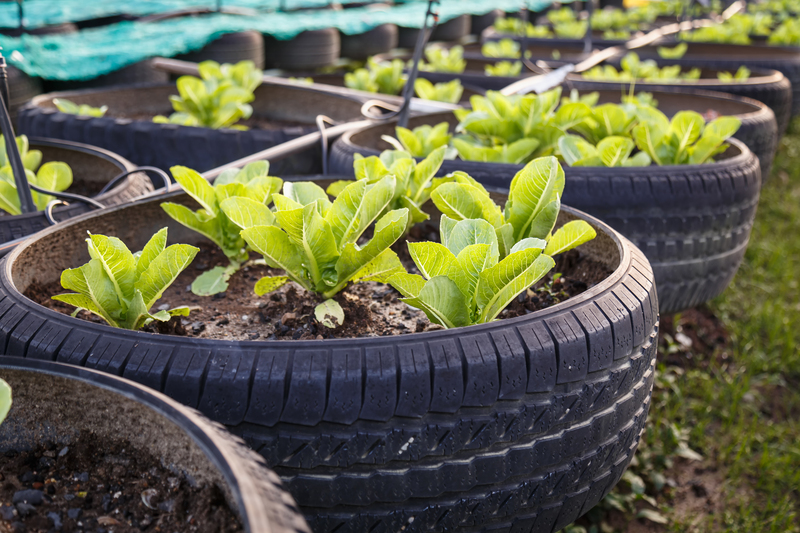Practical Ways to Slash Waste and Promote Eco-Consciousness
In today's consumer-driven society, reducing waste and fostering eco-consciousness are more important than ever. Landfills are overflowing, oceans are polluted, and natural resources are quickly depleting. But change doesn't demand enormous sacrifices--just a mindful shift in our daily habits. In this comprehensive guide, we'll explore the most practical and effective ways to slash waste in your home, workplace, and community. You'll also discover actionable tips to promote eco-conscious living and create lasting environmental impact.
Understanding the Importance of Waste Reduction
Modern lifestyles generate staggering quantities of waste each year. According to the World Bank, global waste is set to increase by 70% by 2050 unless urgent action is taken. Reducing waste and promoting environmental consciousness isn't just a trend--it's a necessity for a sustainable future. Let's dive into why these actions matter:
- Preserves Natural Resources: Slashing waste means fewer raw materials are extracted from nature.
- Prevents Pollution: Less waste means less landfill and ocean pollution, protecting wildlife and ecosystems.
- Reduces Greenhouse Gas Emissions: Proper waste management is a key strategy in tackling climate change.
- Saves Money: Many waste reduction practices lead to significant savings for households and businesses alike.

Everyday Strategies for Reducing Household Waste
1. Rethink Your Shopping Habits
One of the most effective ways to practice eco-awareness is by carefully considering what you buy. Here's how you can minimize excess waste through smarter consumer choices:
- Buy in Bulk: Eliminate unnecessary packaging by purchasing staples like rice, beans, and flour from bulk bins using reusable containers.
- Avoid Single-Use Items: Choose products that are durable and refillable--think water bottles, coffee cups, and shopping bags.
- Choose Minimal Packaging: Opt for products with the least packaging or packaging that is compostable or recyclable.
2. Commit to Composting
Did you know that food scraps account for up to 30% of household waste? Composting is a simple, practical way to slash organic waste and return valuable nutrients to the soil.
- Start a Compost Bin: Whether you have a yard or only a small balcony, there is a composting solution for every space.
- Compostable Items: In addition to food scraps, compost coffee grounds, eggshells, paper towels, and yard waste.
- Local Compost Pickup: Many cities now offer services to pick up compostable materials.
3. Reuse and Repurpose Creatively
Embrace a reuse mentality whenever possible. With a bit of creativity, many everyday items can enjoy a second life:
- Repurpose Glass Jars: Store leftovers, organize hardware, or use as flower vases.
- Transform Old Clothing: Turn T-shirts into cleaning rags or tote bags.
- Reimagine Packaging: Cardboard and plastic containers can become organizers, planters, or crafts for kids.
By upcycling and reusing, you not only reduce your environmental footprint but also save money and foster creativity.
4. Recycle Responsibly
While recycling isn't a perfect solution, it remains a vital part of global eco-friendly waste management. To maximize its impact:
- Know Your Local Rules: Check your municipality's recycling regulations to avoid wish-cycling (placing non-recyclables in the recycling bin).
- Clean and Sort: Rinse containers and separate paper, plastics, and metals as directed.
- Recycle Electronics: Donate or drop off old electronics at e-waste facilities.
Eco-Consciousness in the Kitchen
1. Food Waste Reduction
Up to 40% of food produced globally ends up wasted. Practicing conscious food consumption is both eco-friendly and budget-friendly.
- Meal Plan: Create weekly menus and shopping lists to avoid overbuying perishables.
- Store Properly: Learn how to store fruits and vegetables to prevent spoilage.
- Cook with Scraps: Save vegetable peels or chicken bones for homemade stocks and soups.
- Respect Expiration Dates: Trust your senses and use up items before they go bad.
2. Eco-Friendly Kitchen Swaps
Transitioning to sustainable kitchen practices can drastically reduce both waste and your carbon footprint:
- Use Beeswax Wraps: Replace plastic wrap with reusable beeswax or silicone covers.
- Cloth Napkins and Towels: Opt for washable cloth options over disposables.
- Reusable Food Containers: Store leftovers in glass or stainless steel containers instead of single-use plastic bags.
3. Choose Local and Seasonal
Supporting local farmers and eating seasonally goes hand-in-hand with eco-conscious eating. This reduces the distance food travels, lowering its environmental impact while supporting your community.
Promoting Eco-Awareness Beyond the Home
1. Eco-Conscious Workplaces
Workplaces can generate vast amounts of paper, packaging, and disposable coffee cups. Bring sustainable practices to the office:
- Go Digital: Encourage online documents and minimize unnecessary printing.
- Bring Your Own: Use personal mugs, utensils, and water bottles.
- Green Commute: Walk, bike, carpool, or use public transport to reduce your personal emissions.
- Advocate: Suggest recycling programs or green policies to management.
2. Community Engagement and Environmental Advocacy
Individual actions matter, but collective efforts create real momentum. Here's how you can champion waste reduction and promote eco-consciousness in your community:
- Organize Clean-Ups: Arrange local park or beach clean-ups.
- Educate Others: Host workshops or share resources on sustainable living.
- Support Green Businesses: Choose companies with transparent eco-friendly policies.
- Participate in Policy: Vote for local initiatives and leaders prioritizing environmental responsibility.
Easy Green Swaps and Sustainable Alternatives
1. Reduce Plastic Dependency
Single-use plastics are infamous contributors to environmental degradation. Minimize your reliance with these sustainable swaps:
- Switch to Bar Soap: Avoid plastic-bottled liquid soaps and shampoos.
- Cotton Carriers: Carry cloth shopping bags for all errands.
- Metal Straws: Bring reusable straws when dining out.
- Bamboo Toothbrushes: Opt for compostable brushes over plastic ones.
2. Choose Green Energy
Your energy choices have a huge impact on your environmental footprint. To adopt a more eco-conscious lifestyle, consider:
- Switching to Renewable Energy: See if your utility offers green power alternatives.
- Installing Solar Panels: Offset your household emissions and save on bills.
- Using Energy-Efficient Appliances: Replace old appliances with ENERGY STAR-rated models.
3. Conscious Water Usage
Sustainable water use is vital, especially as global populations grow. These strategies help save water and prevent waste:
- Fix Leaks: Address dripping taps promptly.
- Low-Flow Fixtures: Install low-flow showerheads and toilets.
- Rainwater Collection: Use collected rainwater for gardening.
- Native Plants: Landscape with drought-tolerant, native species that require less water.
Fostering an Eco-Conscious Mindset
1. Practice Mindful Consumption
Before purchasing something new, pause and ask yourself:
- Do I truly need this?
- Can I borrow, rent, or buy it secondhand?
- What is its environmental impact?
Embracing a minimalist philosophy doesn't mean depriving yourself--it means prioritizing quality, function, and sustainability.
2. Stay Informed and Inspired
Environmental science is always evolving. Keeping up-to-date with the latest research, documentaries, and success stories fosters a deeper eco-conscious mindset. Join online forums, subscribe to eco-friendly blogs, and follow thought leaders on social media. Your curiosity can spark positive change!
3. Teach the Next Generation
Cultivating environmental awareness in children is crucial for a sustainable future. Involve them in composting, recycling, and gardening. Read books and watch nature documentaries together. Lead by example--kids absorb what they see!
Overcoming Common Barriers to Eco-Conscious Living
Many people want to reduce waste but encounter challenges, such as lack of access to recycling facilities or higher costs for sustainable goods. Here's how to overcome these obstacles:
- Start Small: Focus on one or two changes at a time. Even incremental progress counts.
- Seek Community Support: Join local sustainability groups or online forums for support, ideas, and encouragement.
- Budget for Sustainability: Remember, many eco-friendly habits (like using less or buying secondhand) actually save money in the long run.
- Share and Swap: Organize clothing or book swaps, and share tools or appliances with neighbors.

The Big Picture: Your Impact Matters
No action is too small when it comes to building a more eco-conscious world. Whether you're composting coffee grounds, refusing plastic bags, or advocating for green policies, your efforts ripple outward-- inspiring family, friends, and even businesses to follow.
If every individual commits to slashing waste and promoting environmental consciousness, we can collectively reverse the tide of unnecessary consumption and pollution.
Conclusion: Start Today, For a Greener Tomorrow
Slashing waste and promoting eco-awareness aren't about unattainable perfection. Rather, they're about ongoing progress, mindful decisions, and collective action. Small, everyday choices lead to significant, long-lasting change.
- Audit Your Waste: Start by noting what you throw away regularly. Identify quick wins for reduction.
- Educate Yourself and Others: The more you know, the easier it becomes to inspire those around you.
- Celebrate Successes: Share your journey, learn from setbacks, and keep moving forward.
Together, let's create a world where sustainable living is the norm and eco-consciousness is at the heart of every choice. Your journey to a greener future can begin right now.
Ready to make a difference? Start implementing these practical waste reduction strategies today, and watch your impact grow!